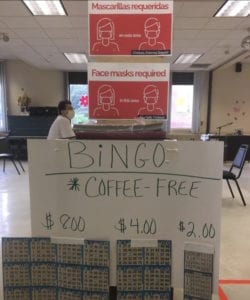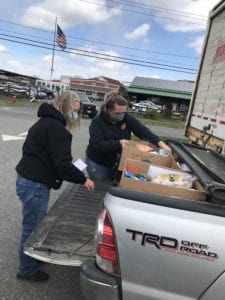Who is a member?
Our members are the local governments of Massachusetts and their elected and appointed leadership.

Bilingual signs remind seniors to wear masks during bingo at the Chelsea Senior Center. (Photo courtesy Chelsea Council on Aging)
Interested in a summer walk-a-thon or an outdoor writing group? How about stopping by for a hot fudge sundae, or a chance to win a Dr. Fauci Fun Kit?
These activities and more are on tap for senior citizens this summer through local councils on aging, which had closed senior centers when the COVID-19 pandemic hit in March but have been working overtime since to ensure that this especially vulnerable group of residents weathers the storm.
“The 350 COAs across the Commonwealth are in various stages of scaling up their operations,” said Elizabeth Connell, assistant director of the Massachusetts Association of Councils on Aging. “As we have often said, ‘If you have seen one senior center, you’ve seen one senior center.’ While restarting certain programs or services may work at one COA, they may not work for another.”
While at least one municipal senior center in Massachusetts, in Chelsea, recently reopened to the public, the vast majority remain closed, according to Connell, due to the ongoing public health concerns. During April, May and June, a Reopening Task Force, convened by the MCOA and including COA directors and interns from the UMass School of Public Health and Health Services, reviewed reopening strategies from “across the state, country, and the world,” Connell said. The group produced a set of guidelines for COAs to use in working with local boards of health and other municipal officials as they consider reopening or scaling up operations at senior centers.
‘A silent problem’
“The number one issue for seniors right now is isolation and depression,” said Lynnfield Town Administrator Robert Dolan, who worked in the retirement and assisted living community industry before entering local government.
While seniors are especially vulnerable to COVID-19, an April article in US News & World Report notes that the restrictions necessitated by the pandemic exacerbate social isolation and loneliness, “a silent problem that has quantifiable, harmful health effects – similar even to smoking 15 cigarettes a day.”
It was with this in mind that the Chelsea Senior Center reopened on June 29, with strict social distancing and sanitization protocols.
“We recognize that many of our seniors have not had much opportunity to socialize during the past few months, and we wish to provide them with a safe opportunity for doing so,” said Chelsea City Manager Thomas Ambrosino. “The city is pleased to … meet the needs of those seniors who feel comfortable leaving their homes and joining in properly separated group activities.”
Chelsea Elder Services Director Tracy Nowicki called the reopening a success, with 28 people attending programs on opening day, though not all at the same time. Seniors must make a reservation to attend any of the six programs now offered at the center, and all participants must affirm that they are virus-free, wear a mask, and sanitize hands when entering and leaving the center.
Remote programming

Volunteers load boxes of fresh produce and protein supplied by the Amherst Survival Center into a truck for doorstep delivery to older adults throughout Amherst. (Courtesy photo)
Elsewhere, COAs are continuing to offer a variety of programming through various remote and virtual means.
“We are open, but the public can’t enter,” said Amherst Senior Services Director Mary Beth Ogulewicz, a member of the MCOA Reopening Task Force.
She said pivoting from in-person to remote methods for meeting seniors’ emotional and social needs has produced a silver lining: a huge expansion in the number of senior citizens the Amherst COA now serves.
Grab and go meals have broadened the reach of the COA’s nutritional programs five-fold, while participation in other offerings, such as classes, guest speakers and support groups, has grown four-fold since going online, she said.
“I have found there has been a remarkable escalation of technical skills among seniors,” Ogulewicz said. “It has allowed us to introduce ourselves to seniors who would never have come to the senior center.”
Pepperell Senior Center Director Susan McCarthy said she hopes to open the senior center at 25% capacity on Aug. 3, if public health data indicate that it’s safe to do so. In the meantime, Pepperell seniors may attend Zoom offerings that include classes in strength training, cooking, Spanish, and technology.
McCarthy said her clients have also adapted “unbelievably well” to increased reliance on technology. The COA partnered with the Greater Lowell Community Foundation and T-Mobile on a pilot program that provides seniors, on a rotating basis, with new tablets preloaded with Zoom and other programs.
On a lighter note, the Pepperell COA sends the “TP Fairy” to surprise one household per week with two rolls of gift-wrapped toilet paper and chocolates, and runs a monthly car show during which seniors drive their decorated vehicles through town. Each Tuesday’s Zoom social hour ends with a weekly winner of the “Dr. Fauci Fun Kit” – prize that could be anything from a face mask to socks or slippers.
Providing meals and groceries through home or curbside delivery is a theme throughout the state. In Southborough, the senior center closed just before the annual St. Patrick’s Day event that typically draws 120 attendees. Assistant Town Administrator Vanessa Donovan Hale said the town is planning to recreate the event this summer with corned beef and cabbage meals picked up outside the senior center, and live Irish music playing while seniors wait in their cars.
“It’s part food and part things folks can work on at home,” she said of the Southborough COA’s drive-through program, which over the summer will also feature a traditional barbeque and a picnic lunch.
Food is also the focus in Hampden, according to Board of Selectmen Chair Donald Davenport. The Hampden Senior Center’s drive-through Grab and Go Lunch program, sponsored by Greater Springfield Senior Services, provides meals for 80 to 120 senior citizens per day, Tuesday through Friday. In addition, “well over 2,000” meals have been prepared by private caterers and delivered to the Hampden Senior Center by the Pioneer Valley Regional Transit Authority for pick-up during the pandemic, Davenport said.
The Belchertown Senior Center has seen a 44% increase in its Home Delivered Meals program since February, necessitating the addition of a fifth delivery route. Staff members from other departments have been reassigned to the Nutrition Department and work staggered shifts to meet the demand.
Belchertown also began a Community Pantry during the pandemic, where those in need can “take a can/leave a can” outside the Senior Center, in addition to bread donations from Stop & Shop that are rotated daily.
Select Board Member James Barry said the board is proud of “the effort our staff have put into assisting our seniors as much as possible.”
On the nutrition theme, Swampscott Acting Town Administrator Julie DeLillo said volunteers had been developing a new food pantry last winter that quickly blossomed when COVID-19 hit. The Anchor Food Pantry now delivers groceries to 70 to 75 senior citizens each week, and other seniors volunteer to pack and deliver the food.
While outreach and nutrition have been the Swampscott COA’s mainstays during the pandemic, “now we are trying to see what else we can do,” DeLillo said, noting that outdoor, socially distanced knitting and writing groups began in June, and the COA is beginning rides to medical appointments this month.
Switching gears
“The COAs did not close when the pandemic was declared,” said Tara Hammes, MCOA director of member services and nutrition, during a July 1 webinar held by the MMA Human Services Council and the Executive Office of Elder Affairs. “They just changed the way that they were providing services.”
In Hudson, for example, Town Manager Thomas Moses reports that, although technically “closed,” the Senior Center continues to provide a range of services, including Meals on Wheels, fuel assistance, help enrolling in Medicare health and prescription drug plans, medical and social case management, and yoga and fitness classes.
Lexington Senior Services has added financial assistance to the list, thanks to a $250,000 donation from Takeda Pharmaceutical Company. Assistant Director of Senior Services Hemali Shah said the Senior Center probably won’t reopen until September. In the meantime, Lexington’s staff is collaborating with nearby COAs – Acton, Arlington, Bedford, Boxborough, Burlington, Carlisle, Concord, Harvard, Lincoln, Maynard, Stow, Wilmington, Winchester and Woburn – through weekly meetings.
“Our goal is to align our reopening phases to ensure no one senior center in our region would be burdened by an influx of participation if one were to open before the other,” Shah said. “We continue to have these conversations to share ideas, provide advocacy, troubleshoot challenges and work together to ensure our seniors are safe.”
Written by Lisa Capone